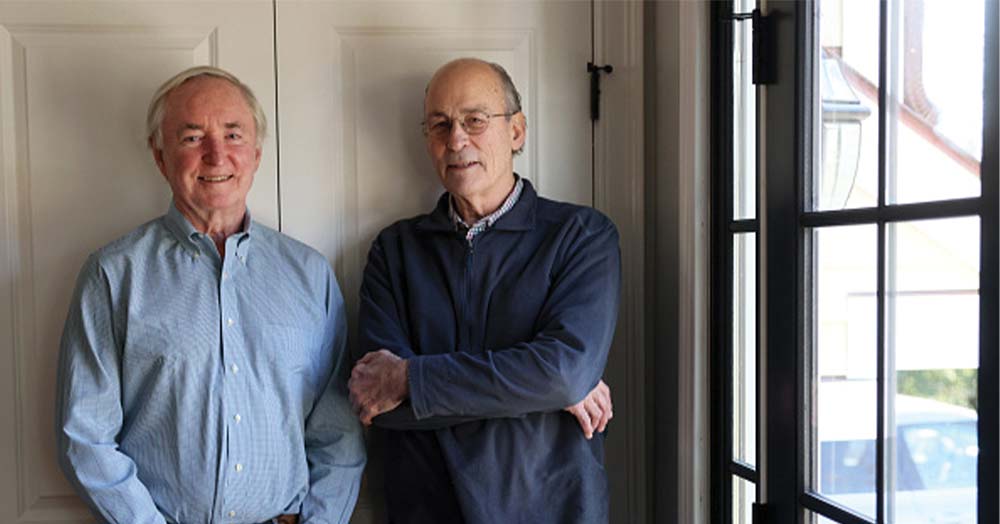Pulitzer Prize-Winning Author Returns to Iowa for Book Event
 PHOTO: BOSTON GLOBE VIA GETTY IMAGES
Author Tracy Kidder, right, poses for a portrait with physician Jim O’Connell, who founded Boston Health Care for the Homeless.
PHOTO: BOSTON GLOBE VIA GETTY IMAGES
Author Tracy Kidder, right, poses for a portrait with physician Jim O’Connell, who founded Boston Health Care for the Homeless.
Iowa Writers’ Workshop alum Tracy Kidder (74MFA) spent five years following physician Jim O’Connell around the streets of Boston as he provided medical care for people experiencing homelessness. The resulting book, Rough Sleepers, was released last year and became a New York Times bestseller.
Described by The Baltimore Sun as “a master of the nonfiction narrative,” Kidder returns to his alma mater Oct. 15 for a Literary Legends lecture in conjunction with the Iowa City Book Festival. The Vietnam veteran is the author of several books, including The Soul of the New Machine, about the then-inchoate computer industry, which won the 1982 National Book Award and Pulitzer Prize. Iowa Magazine recently met Kidder at his elegant, antique-filled home in Williamsburg, Massachusetts, for an interview, which has been edited for length and clarity.
You seem to have impeccable timing in releasing the right book at the right time. The Soul of the New Machine came out just when people became aware that computers would play a part in their lives. House released when the Baby Boomers were buying their first homes. Among Schoolchildren came out when they were putting their kids in schools. Was that strategic or serendipitous?
I just got crazy lucky. I’d just done a big article about Vietnam combat veterans. I remember saying to [my Atlantic Monthly editor Dick] Todd, “What do I do next?” He said, “Why don’t you look into computers?” I didn’t realize that it was timely, to be honest. I was interested in House because I’d just bought this place, and it was falling down. Among Schoolchildren was the idea of Susan Todd, Dick’s wife. She was an elementary school teacher who later became a principal.
You write about heroes whose missions are equal parts herculean, quixotic, and Sisyphean. They are sympathetic heroes, because they are fighting battles they can’t win. Paul Farmer in Mountains Beyond Mountains can’t defeat poverty in Haiti. O’Connell can’t win his battle against homelessness. Is it hard to write about heroes?
I don’t think the Paul Farmer book was hagiography. He’s a complicated guy, but it was incredible what he’d done in the world and the challenge that he represented. It upset me, the stuff we saw. It was ’94, so the U.S. invasion of Haiti had just happened. You’d see women giving birth by the sides of dirt roads. Things that hadn’t ever gotten deep into my consciousness, and here was a guy who said, “Okay, I’m gonna do something about it.”
Jim O’Connell was amazing as a subject. He just decided he was going to trust me, and he made it possible for me to have as much access as I could possibly have.
The main “rough sleeper” in your book, Tony Colombo is utterly compelling: the substance-abusing, former sex offender staying up all night to protect the women sleeping under bridges.
I wanted to give the illusion of a whole panel of patients, but you can’t write about a hundred people and be able to tell them apart. I had to have one central character. I got awfully fond of that guy. Here’s this guy who was just desperate to find some purpose in his life.
As diverse as Iowa Writers’ Workshop alumni are, they all share the belief that books matter. Sometimes it seems like the writer who hopes his books will make a difference also faces a monumental task. Do you hope your books will make people more aware, caring, and compassionate?
It’s nice to think that. I’ve got to say though, somewhere along the line, I lost faith that it would make a difference. I wrote a few things for The New York Times about Haiti that you hope might move the needle in some way or other, but more and more, I don’t try to do a good deed. I’ve just been learning about people who are doing good deeds.
Maybe making these problems visible is enough.
We ought to know these things are going on. It’s easy to ignore. We have this sleight of mind when you can just not see people anymore. We’ve got to live our lives. You can’t stop and worry over every homeless person. But you can recognize that they’re human beings.

